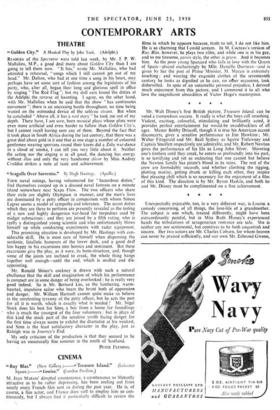"Seagulls Over Sorrento." By Hugh Hastings. (Apollo.)
FOUR naval ratings, having volunteered for " hazardous duties," find themselves cooped up in a disused naval fortress on a minute island somewhere near Scapa Flow. The two officers who share their exile are slightly Olympian in manner, and the men's lives are dominated by a petty officer in comparison with whom Simon Legree seems a model of sympathy and tolerance. The secret duties which they are there to perform are presently revealed as the testing of a new and highly dangerous war-head for torpedoes used by midget submarines ; and they are joined by a fifth rating, who is really a distinguished young scientist and who unfortunately blows himself up while conducting experiments with radar equipment.
This promising situation is developed by Mr. Hastings with con- siderable skill. He is most sure of himself when dispensing the sardonic, fatalistic humours of the lower deck, and a good deal less happy in his excursions into heroics and sentiment. But these excursions give the play, as it were, its bone-structure, and, though some of the joints are inclined to creak, the whole thing hangs together well enough—until the end, which is muffed and dis- appointing.
Mr. Ronald Shiner's cockney is drawn with such a natural ebullience that the skill and imagination of which his performance is compact are in some danger of being overlooked ; he is really very good indeed. So is Mr. Bernard Lee, as the lumbering, warm- hearted, impulsive sailor who bears the brunt both of oppression and danger. Mr. William Hartnell cannot quite' make us believe in the unrelenting tyranny of the petty officer, but he acts the part for all it is worth, which is exactly what is needed ! Mr. Nigel Stock does his best for Sims, a boy from a home for foundlings who is much the youngest of the four volunteers : but in plays of this kind the stock part of the sensitive youth facing danger for the first time always seems to exhibit the dramatist at his weakest, and Sims is the least satisfactory character in the play, just as Raleigh was in Journey's End.
My only criticism of the production is that they seemed to be having an unnaturally fine summer in the north of Scotland.
PETER FLEMING.


































 Previous page
Previous page